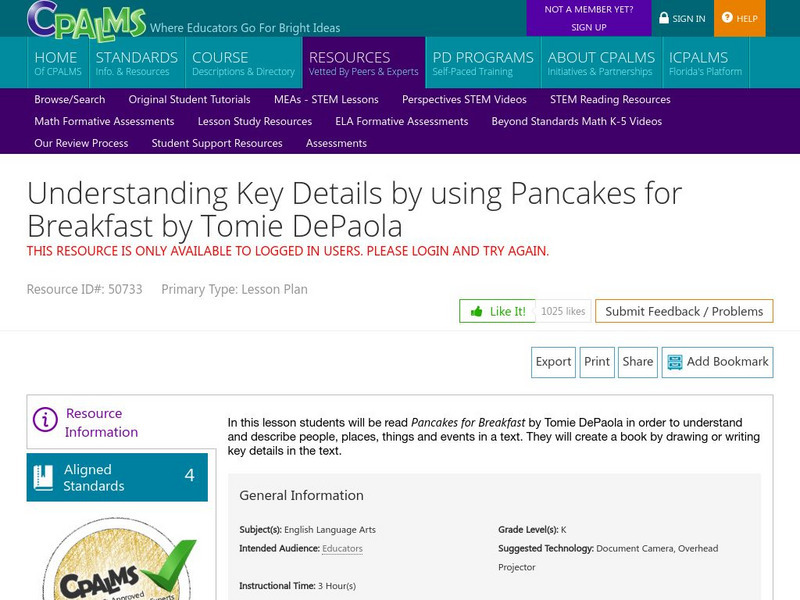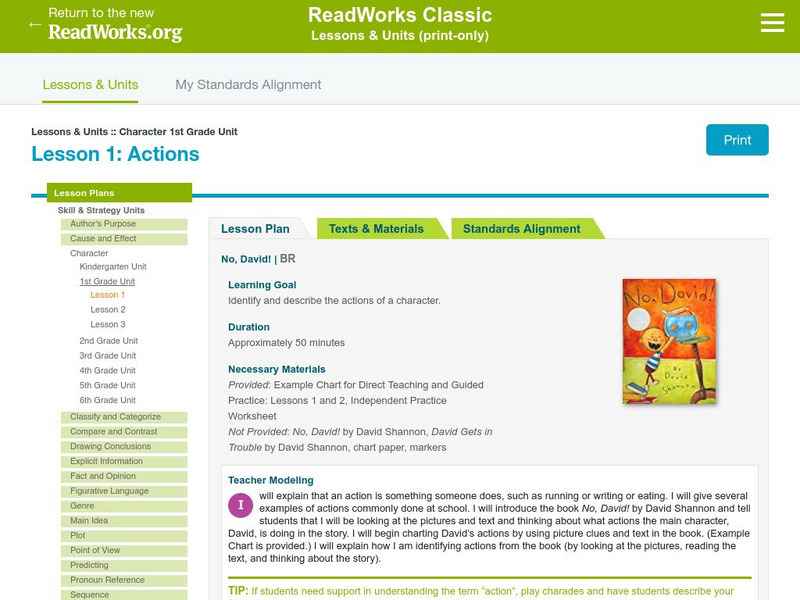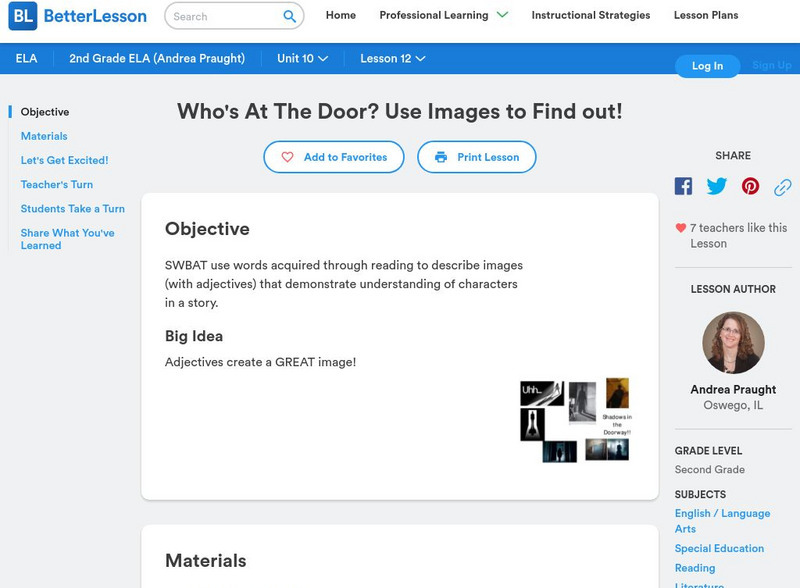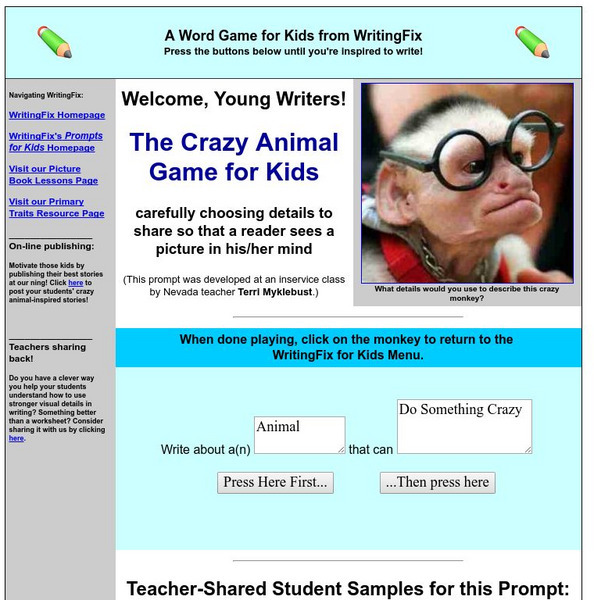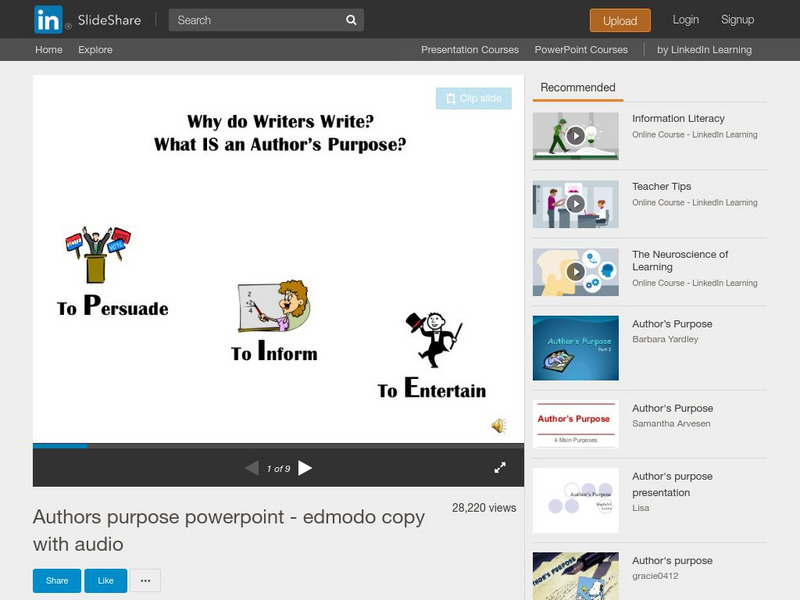Better Lesson
Better Lesson: Miss Nelson Is Missing Key Details
Where did Miss Nelson go? We look at the key details in the text to determine what is happening throughout the story. Students will locate and record key details about story elements (characters, setting, problem, solution, and theme) in...
CPALMS
Cpalms: Understanding Key Details by Using Pancakes for Breakfast
[Free Registration/Login Required] In this lesson, students will be read Pancakes for Breakfast by Tomie DePaola in order to understand and describe people, places, things and events in a text. They will create a book by drawing or...
Better Lesson
Better Lesson: Describing a Memory
Students will be able to use a combination of drawing, dictating, or writing to narrate a single event and provide a reaction to what happened. This lesson centers around the book "The Song and Dance Man", a great Grandparents Day activity!
Better Lesson
Better Lesson: Guess My Solid
Descriptive details are used as students develop a guessing game poster for others to try and guess their chosen solid. Included in this detailed lesson plan are videos, samples of student work, a printable worksheet, an assessment...
Read Works
Readworks: Read Aloud Lesson: Stellaluna
Compare Stellaluna's experience of living like a bird with her experience of living like a bat. Included in this instructional activity are a detailed lesson plan, a graphic organizer, and a student worksheet.
Read Works
Read Works: Lesson 1: Actions
In this resource, students will practice identifying and describing the actions of a character. Teachers will model these skills through the use of text and pictures from the story No, David! by David Shannon. Students will then draw a...
Better Lesson
Better Lesson: Tie It Up With Transition Words to Write a Story!
Read, write, and present a digital narrative with transition words to help us put the events in order! After modeling the lesson, groups of learners will write narratives to recount a short sequence of events, they will include details...
Better Lesson
Better Lesson: Who's at the Door? Use Images to Find Out!
Students will use words acquired through reading to describe images (with adjectives) that demonstrate an understanding of characters in a story. The teacher will read Miss Nelson is Back which has great descriptors and will hold a class...
CPALMS
Cpalms: Wild About Authors and Illustrators
[Free Registration/Login Required] In this lesson, young scholars learn about the roles of authors and illustrators through games and book-writing. Students will have an opportunity to act out the roles of illustrators and authors. They...
Writing Fix
Writing Fix: The Crazy Animal Game for Kids
Students use this writing topic generator to choose an animal and a crazy action the animal is able to do in order to give them something fun and creative to write about.
Writing Fix
Writing Fix: A Small Moment With an Important Person
A writer's workshop idea where students brainstorm a list of people who are important to them as well as one or two times they remember being with each person. Students then use these ideas to write about a small moment with someone who...
Writing Fix
Writing Fix: Great Lists Inspire Great Writing
A writer's workshop idea where students work together to brainstorm a list a possible writing topics to use throughout the year. Idea lists for primary and intermediate students are provided.
E Reading Worksheets
E Reading Worksheets: Setting Worksheets
In this learning module, students will study the concept of setting in literary text. Worksheets and PowerPoint lessons are provided to help students practice with finding "settings" and then citing reasons that support their answers.
Curated OER
Mc Graw Hill: Part 1: Reading Literature: 1st Grade Retell Stories
Learn how to use retelling a story to increase student's comprehension of a story.
Curated OER
Mc Graw Hill: Key Ideas and Details: Retell Stories
Read a passage to discover how to retell a story then practice what you've learned.
Curated OER
Mc Graw Hill: Major Events
Learn how writers use details to describe major events in a story.
Curated OER
Mc Graw Hill: Part 1: Reading Literature: Use Illustrations and Details
Learn how drawing characters, settings, and events can help with reading comprehension.
Curated OER
Mc Graw Hill: Compare Characters' Point of View
Defines and explains how to show how different characters think and feel.
ReadWriteThink
Read Write Think: Writing Workshop: Helping Writers Choose and Focus on a Topic
Students engage in writing workshop, using a timeline to focus in on and write about a specific event.
Writing Fix
Writing Fix: Story Starters: Intriguing Titles
In this lesson, an interactive link included to help generate ideas for stories. A button is clicked and a topic is given. In a writer's notebook or journal, each student will use the topic given and develop it. [Requires Adobe Reader.]
Houghton Mifflin Harcourt
Harcourt: School Publishers: Test Tutor: Sequence
Students will increase their reading comprehension skills and understanding of story sequence by reading a passage of text and then answering questions about the order of events.
Writing Fix
Writing Fix: The Adjective Game for Kids
Students use this writing prompt generator to choose a writing topic and three adjectives to use in an original piece.
Reading Rockets
Reading Rockets: Top 10 Things to Know About Reading
What are the top ten things you should know about reading?
Tom Richey
Slide Share: Why Do Writers Write?
A slide show with nine slides explaining the author's purpose to persuade, inform, or entertain.



